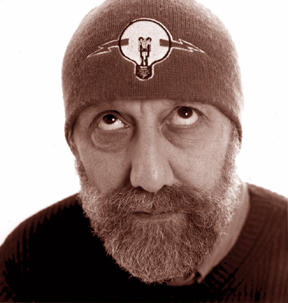Journalism is often described as a first draft of history, but island journalist
Fred Moody says his new book is a second draft.
The longtime writer for such Seattle publications as the Weekly and the Times combines history with first-hand account in “Seattle and the Demons of Ambition: A Love Story” (2003, St. Martin’s Press) to chronicle the boom-to-bust dot-com frenzy of the late 1980s and 1990s.
“I wrote the book not only as something the city went through,” Moody said, “or as something I went through, but considering how many thousands of people went through the same thing, how many thousands of people are now trying to come to terms with the boom.”
Moody’s book describes Seattle history as repeated cycles of boom and bust, in discursive chapters that examine founding father “Doc” Maynard’s loss of a potential fortune in real estate; the city’s long relationship with Bobo the Gorilla, a public figure and object of intense affection from the early 1950s to its death in 1968; the rise and fall of the grunge music scene; the poor planning by Seattle leaders that fueled the WTO riots there in 1999; and the debate over Safeco Field.
Although he covers a lot of ground, Moody’s book is unified by his thesis that the essential spirit of the city is embodied by “Lesser Seattle,” the laid-back, low-key, unpretentious core of the Northwest urban landscape. Native son Moody loves down-at-heel Seattle, the city of last resort for East Coast refugees – a place where lack of ambition is nearly as pervasive as it was nationwide in the 1960s.
But with the advent of Microsoft, Starbucks, Amazon and other start-up companies in the 1980s, quiet Seattle is transformed into boomtown.
Moody watches in horrified fascination as “his” Seattle becomes the destination of choice for the young and ruthless.
A firestorm of ambition and greed – whipped up on the East Side and blowing into the city proper – co-opts Moody’s friends and co-workers.
“It took places like the Weekly apart,” Moody said. “Everybody there was preoccupied with friends who’d left journalism to make money. Everybody was asking, ‘Why don’t I do that, too?’ That constant ambivalence….”
Some of the book’s strongest passages feature excerpts from Moody’s interview with Bill Gates in the early 1990s for a New York Times Magazine article.
The book quotes Gates: “We should all be pretty humble because a lot of things could have happened differently.”
Moody recalls, “He was quite prescient, and much more interesting than anyone’s given him credit for being.”
Not so the legion of startup culture followers, who Moody says parlay luck and good timing into fortunes without producing a product.
The sandwiching of first-person with historical perspective in “Demons” has raised ire among some Seattle reviewers.
But the story’s human dimension may make the book far more gripping than an “undiluted” history might have been.
“It’s neither history nor memoir, and that presents a challenge for people trying to pigeonhole it,” Moody said. “I like the book because it’s about real people and not just technology.”
Without the writer’s ruminations, several of the book’s more illuminating themes would have been lost: Moody addresses the love-hate relationship one may have with place, a relationship as conflicted and as passionate as any other.
Another personal issue with broad application is the ongoing conun-
drum that not only journalists, but all people who find their way into professional careers in the arts and humanities, must grapple with: watching everyone else make tons of money, and fighting off the urge to go do likewise.
By the time Moody decides to join the party, it’s too late; his own ambivalence sabotages half-hearted attempts to cash in.
He encourages a fellow Weekly employee to apply for a plum position as an editor at Amazon instead of applying himself; he passes up other chances.
In a sense, it’s the worst of all possible worlds for Moody, as he mentally acquiesces to the frenzy without the payoff.
“My fatal mistake was to try to cash in on the boom,” he said. “Turning my back on all the things that meant so much to me was sort of reprehensible. In my own defense, I waited too long.
“Failure to cash in becomes a moral choice instead.”
The end of the book finds Moody trying to make sense of the boom experience. His conclusion: Seattle is not in such bad shape.
That big new stadium looks sort of harmless and temporary, he says, and in other ways Seattle is reasserting what Moody believes is the city’s essential nature in the wake of the boom.
“It’s like after (Mount) St. Helens,” he said, “when you see the first little green shoot start to come up.”


